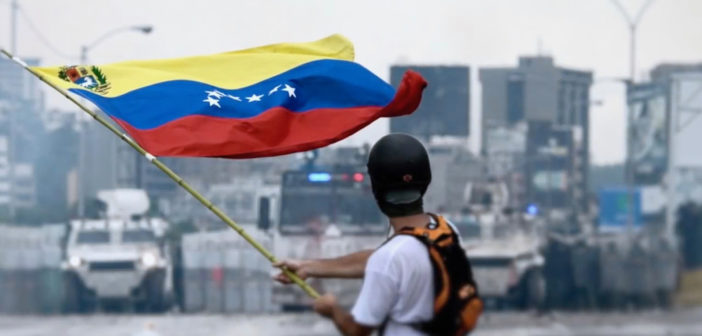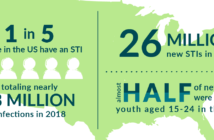tribulant_slideshow gallery_id=”160″]
For more than four years, the oil-rich Latin American country of Venezuela has experienced a significant turn for the worse both politically and economically, sending millions of native Venezuelans into poverty and sparking outrage and protest across the country. Thousands now flee the country to seek a better life for themselves elsewhere, while others cross the border into Colombia to purchase food and water because none can be found locally.
“The current situation includes shortages of food and medicines, the world’s highest criminal rate, dreadful sanitary conditions, constant violation of human rights, numerous corruption scandals, political prisoners, and inflation,” said Laura Perez, a junior from Venezuela.
Perez left Venezuela in 2014 to study in the United States, and this was around the time in Venezuela when the prices were shooting up, safety issues were arising, and the food shortages was starting, according to Perez. Also, Perez’s entire family also currently resides in Venezuela, and she traveled back to Venezuela during this past summer in the heart of the crisis.
“My experience in the midst of the crisis was awful. It was difficult for me to adapt to all the restrictions that everyone must accomplish to be safe in my country. The insecurity problem is worse than ever and I was so stressed out trying to be aware of everything happening in my surroundings. At the same, it was shocking to see how the food and medicine shortage have increased. It is a horrible situation that includes deplorable human conditions.”
These problems and social issues appear to stem from the political unrest in the country, which seems to have started with the election of Hugo Chavez then carried through with the most recent incident of Chavez’s party, United Socialist Party of Venezuela, which was speculated to be rigged. Nevertheless, this election was later ruled valid by the Supreme Court of Venezuela. However, in Venezuela, this is not a matter for the Supreme Court to decide, but rather the National Assembly of Venezuela, the equivalent to United States’ own Congress.
The Venezuelan National Assembly has been hard at work in an attempt to stop Venezuela’s decline as well, passing numerous bills and proposing multiple solutions to Maduro. However, Maduro, along with his Supreme Court, continue to overturn the Assembly’s laws and solutions, ruling them unconstitutional. Human rights groups around the world, along with the Venezuelan National Assembly itself, have since denounced Maduro as a dictator, who is abusing his power and disregarding the rule of law to enforce his rule over Venezuela. Maduro has also called for the National Assembly to be dissolved, sparking outrage amongst the 14 million Venezuelans who voted in favor of the Assembly in the elections of Dec. of 2015. As a result, thousands of Venezuelans took to the streets in protest.
“The reasons behind the protest are numerous, but the primary reason why the protest started was the government’s announcement informing that they would dissolve Venezuela National Assembly. I believe that this announcement was the last thing that Venezuelans could support. The elimination of the National Assembly meant the end of democracy. This dissolution was the only independent institution acting against Nicolas Maduro regime,” said Perez. “The government decided to disrespect the people’s decision and just dissolve the organization.”
Because of the above actions, hundreds of thousands of Venezuelans took to the streets again in mass protest during the summer of 2016. Hundreds if not thousands have died as a result of the Bolivarian backlash to the protests, leading to even more violence and animosity between the two sides, according to Business Insider and the Wall Street Journal.
President Maduro, in an attempt to appease his people, set forth several economic and social executive orders from 2013 to 2015, but only managed to make the situation worse. The global fall in oil prices is considered to be the primary cause of such drastic economic disaster, as the Venezuelan economy depends upon it almost exclusively, however, Maduro’s reforms didn’t help any either.
“In my opinion, Nicolas Maduro does not have any criteria; all the policies that he has been implementing in Venezuela are influenced by Cuba’s government. I think that his Bolivarian ideals do not work at all. These ideals are just trying to expand the communism in the region,” said Perez.
Perez also commented on what she deems is the root cause of the issues faced by Venezuelans and she offered a solution.
“In my opinion, the corruption is the major cause of the issues faced by Venezuela. The only solution to all the previously mentioned problems is the exit of Nicolas Maduro from power,” said Perez. “He is not prepared to the responsibility he has. All the socialist practices that have been implemented by the government does not work for people, and that is why the situation gets worse with the passage of the time.”
According to the Wall Street Journal, the Venezuelan currency has since been downgraded, and the inflation rate has exceeded 100%. Basic commodities, such as bread, cereal products, eggs, milk, and other foodstuffs, are in short supply, and the food that is available is too expensive to purchase for the average Venezuelan. According to reporters at CNN, in an effort to stifle the shortages and rising costs, Maduro enacted an executive order that declared Venezuela to be in a state of national emergency, as well as including a provision that forces the nation’s citizens to work in agricultural fields for a period of 60 days.
“Even though both of my parents are professionals and work every day it is difficult for them to buy food and medicines. It is so expensive to find first necessity items, and when you finally find them, the prices are incredibly high,” said Perez. “For example, Venezuela’s minimum wage is equivalent to $12.53. Someone that is paid that amount has enough to buy 2 liters of milk, and they would have no more money for the rest of the month.”
Sadly, thousands of others are resigned to eating scraps by following garbage trucks throughout their city, taking anything that is edible and consuming trash just to survive. In fact, according to the newspaper “Diaro Las Americas,” a prominent Spanish newspaper for the Hispanic community worldwide, more than 15 percent of all Venezuelans eat garbage on a daily basis, mostly discarded from richer communities and commercial establishments such as restaurants, movie theaters, and sporting facilities.
“I have seen people who survive this way,” said Perez. “When I went to Venezuela in May, I realized that every time I was around the city, I saw two or three people eating from the garbage. It was incredible hard for me to see how the government policies and ideals of communism has driven people into extreme poverty and hunger.”
Also, there are issues in the prison system as well. In late 2016, according to Fox News Latino, more than 40 inmates were murdered, dismembered, and consumed by the other inmates of a prison after government officials were forced to abandon state-run prison facilities. More than 200 prison riots broke out across Venezuela, leading to the breakout of thousands of convicts throughout the country, also according to the same source.
Clearly, Venezuela is in the midst of a catastrophic crisis that has seemingly no end in sight. Protests across the nation continue as Maduro attempts to hold onto his authoritative regime, stifling efforts for meaningful and comprehensive reform. In his neglectful wake, millions of Venezuelans suffer as they lack the necessities to survive. Only time and patience will tell if the people of Venezuela and the national community at large will continue to allow this state of affairs to continue much longer, or if the situation continues to degrade further under an inept and corrupt ruler.





